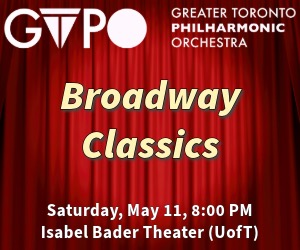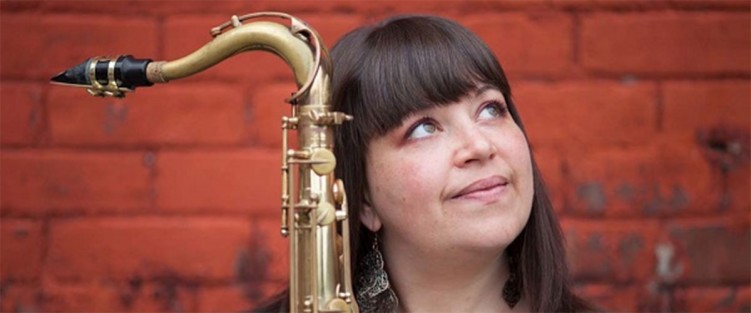 When I was a child in pre-amalgamation Toronto, any trip past Bloor Street on the Yonge line was “north” to me, with the magic moment being when the subway emerged from the tunnel and went above ground; for a magic moment you could pretend you were on a different kind of train bound for who knows where.
When I was a child in pre-amalgamation Toronto, any trip past Bloor Street on the Yonge line was “north” to me, with the magic moment being when the subway emerged from the tunnel and went above ground; for a magic moment you could pretend you were on a different kind of train bound for who knows where.
Conversely, now, when I ride exactly that other kind of train to visit Toronto, my definition of “south” has something to do with the point at which, in fall, I notice the red of maple trees starting to creep in among the yellow-gold of tamarack, birch and poplar.
Most Toronto musicians I know have a similarly personal border between what constitutes “local” and “out of town” gigs. Drummer, composer and bandleader Ernesto Cervini, for example, defined that line to me as “how far I am willing to drive after the gig” - and that the drive from Kitchener is manageable, but the drive from London pushes the limit.
Greater Sudbury: Sudbury on the other hand is solidly “out of town” by any definition: four hours north for Cervini, and seven to eight hours southeast for me, it manages to fit most people’s definition of Northern Ontario. It hasn’t popped up in The WholeNote’s listings often (so far anyway) but the city has a long tradition of music, and of nurturing young musicians.
Saxophonist and vocalist Elena Kapaleris reflects on the role that community and mentorship played in her own development: “Growing up in Sudbury,” she says, “ I was very fortunate to be surrounded with opportunities to play with and learn from a lot of great musicians that cared about the live music scene.”
And, she notes, the Sudbury scene, if not the city itself, has profoundly impacted the music contained in The WholeNote’s regular listings: “Many other Toronto musicians grew up in that scene… Kevin Turcotte, Reg Schwager, Don Scott, Christian Overton, Sundar Viswanathan, just to name a few off the top of my head”.
While the loss of the music programs at Laurentian in 2021 and Cambrian College in 2022 are two examples of what is becoming an unfortunate trend across the province, Kapaleris points out that mentorship in jazz takes other forms: she remembers the musicians who invited her to sit in on their gigs for a tune or two while she was still in high school. “Local players from that time were such great musicians to learn from. Again to list just a few, pianist Tony Simpkin, sax player Allan Walsh, drummer Jack Broumpton, bassist Brian Quebec, sax player Jean-Yves Begin. It also put young musicians at an advantage that many of the high schools had thriving music programs with great bands.”
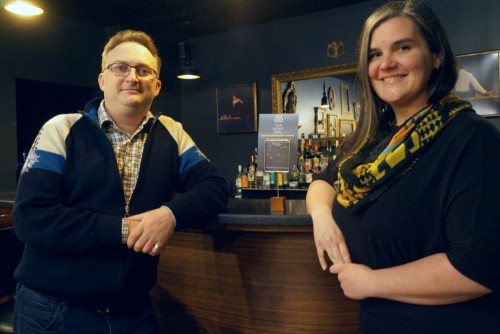 The Night Owl: Now, Cervini and Kapaleris are two of the Toronto-based musicians making the trip to Sudbury, one at a time, as a part of the Jazz Series at The Night Owl, which brings individual out-of-town artists to play with local musicians. Guitarist James Dorland, the endlessly energetic force behind the series, says the idea came from “a desire to have a consistent Jazz performance presence in the city instead of a once-a-year festival.”
The Night Owl: Now, Cervini and Kapaleris are two of the Toronto-based musicians making the trip to Sudbury, one at a time, as a part of the Jazz Series at The Night Owl, which brings individual out-of-town artists to play with local musicians. Guitarist James Dorland, the endlessly energetic force behind the series, says the idea came from “a desire to have a consistent Jazz performance presence in the city instead of a once-a-year festival.”
The decision to bring one musician at a time was partly based on a desire to be able to guarantee a fair compensation, Dorland explains, but he also saw a need to fill the void left by post-secondary closures. “Historically there were similar initiatives where musicians would be invited up to play with local faculty. The goal of this series was to facilitate and encourage spontaneous dialogue between local players and visitors.”
Dorland initially met venue owner Liana Bacon in their high school’s music theatre program, and when she opened the Night Owl, a speakeasy bar and restaurant hidden away in the downtown, he saw its potential. He wanted a small space with minimal amplification that would mirror the intimacy of what was happening musically – especially when musicians are meeting each other for the first time on the bandstand.
The speakeasy is attracting new audiences, he says, and he takes time to engage with them to help them understand what is happening. “Think of it as a musical ‘first date’ where the parties are putting their best foot forward in order to provide the best experience for the other person in the hopes of taking it to the next level. Like any date, it could go well or it could go bad but the energy of uncertainty is the same.”
Drummer Tim Shia is among the artists already booked to appear at the Night Owl in 2025 and says that gigs like the Night Owl serve an equally important purpose for the musicians who make the trip. “I made a deliberate effort to connect with people in every place I tour in order to build an informal network where if someone needed something coming through Toronto, I could help out and vice versa. Musicians are a generous lot for the most part, especially the ones who have had to deal with the vagaries of touring”.
Dorland is now working with Sudbury Jazz Festival director, multi-instrumentalist and composer Louis Simão to pursue funding to also start bringing these musicians into Sudbury region school boards. He hopes that by being proactive about pursuing funding and collaborative opportunities, he will be able to book more musicians who are “passing through”.
Dorland’s optimism and energy are infectious, but there is one nagging doubt that is hard for me to put to rest. Since 2016, I have observed that, when touring west, many Toronto based jazz musicians simply skip over Ontario all together, rather than “passing through.”
Ontario is very VERY big: The question I find myself asking is this: Does the infrastructure exist to make Sudbury a “main stop” on a northern tour focused solely within the vast geography of this province”.
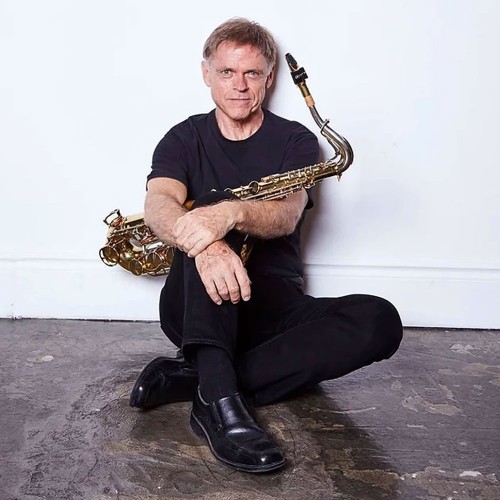 John MacMurchy, a musician, composer and photographer who moved back to his hometown of Collingwood in 2018 seems to think so. He observes that, while he doesn’t play as often, “I don’t mind because no one around here expects musicians to play for the tip jar. There is an audience in the south Georgian Bay area for live music.” Many of these opportunities are concert series put on by dedicated volunteers in spaces like libraries, town halls and churches – sometimes housing beautiful pianos or great acoustics.
John MacMurchy, a musician, composer and photographer who moved back to his hometown of Collingwood in 2018 seems to think so. He observes that, while he doesn’t play as often, “I don’t mind because no one around here expects musicians to play for the tip jar. There is an audience in the south Georgian Bay area for live music.” Many of these opportunities are concert series put on by dedicated volunteers in spaces like libraries, town halls and churches – sometimes housing beautiful pianos or great acoustics.
He worries though about what will happen to that creative infrastructure in the long term: “A lot of the support for the arts is by volunteers. A wonderful man who leads a thriving local jazz society is 98 and can’t leave his house anymore but he still works away at trying to keep the music playing. But their ranks are not being filled by younger folks.”
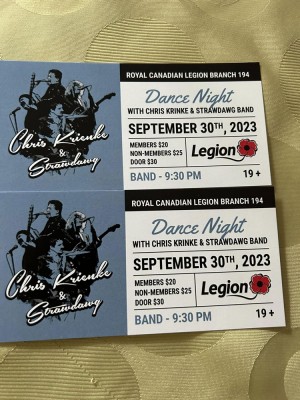 Libraries and Legions: This trend is echoed in my own still-more-northern community and is not restricted to the arts world either. Albena Liebigt, who now sits as past president of Royal Canadian Legion Branch 194 in Hornepayne explains: “The Legion is the Hub of the community. It’s the only large venue for gatherings such as dances and concerts indoors”.
Libraries and Legions: This trend is echoed in my own still-more-northern community and is not restricted to the arts world either. Albena Liebigt, who now sits as past president of Royal Canadian Legion Branch 194 in Hornepayne explains: “The Legion is the Hub of the community. It’s the only large venue for gatherings such as dances and concerts indoors”.
It also has the distinction of being the only place in town with a liquor licence. Our executive manages to spin our $40 annual dues, bar sales and cover charges into the $3,000 to $5,000 fee to bring live music to the community every month or so – a community, I should add, that is willing to pay $20 or $30 for a ticket. But Liebigt fears for the long term viability. “It’s a struggle to get volunteers and I’ve been looking into enticing the younger generation to take over, as all current volunteers are 68 years and up. My greatest fear is that we lose the Legion completely if no one steps up.”
Libraries too are doing their part to keep the music alive. Our local library has amassed an entire musical instrument lending collection, and hopes to start doing more music when it eventually moves to a new location with enough space. Our small and mighty team of librarians creates a huge amount of community programming, and grants exist that could support them, but the space runs on an incredibly limited number of HR hours. Eligibility for funding, doesn’t necessarily mean having the human resources or time to put these applications together. Maybe artists have a role to play here in the short term: stepping up to support the organizations that support us - grant writing is a skill we collectively bring to the table!
Redefining local: The post-pandemic music scene is an opportunity to rethink how we (and arts councils) define touring. If a series of gigs take place on (mostly) consecutive nights, each in a different community within one’s personal “local boundary” shouldn’t it count as a tour?
Map all the Legions in Ontario, and you end up with a list of 405 branches in 356 communities; 260 of these branches already have some kind of live music. (Legion brass or pipe and drum bands may not quite be your thing, but they tell you that music already has a home in that place.)
Add a map of Ontario libraries and you find many of these same communities, plus 219 more! Libraries that might host concerts already, or be the home to a beautiful if underutilized piano, or have a musical instrument library full of young people eager to learn.
That’s 518 places where your music could have a first date with a community, in a venue whose name reflects a former municipality or village or town that still lives on in the names of local musical ensembles, the consciousness of its residents, and the presence of a local arts council that might provide support to get something off the ground.
All we need now is a map of all of the Ontarians with the same imagination and energy as James Dorland.
A sample of Toronto/Sudbury Sudbury/Toronto musical commuters in February and March!
Ori Dagan - Night Owl (NO): Feb 8; Toronto (TO): Feb 14; El Mocambo; Feb 24 Luma Restaurant, TIFF Lightbox.
Elena Kapeleris - NO: Mar 7; TO: every Mon in Feb, Cameron House w. Friendly Rich and the Lollipop People; Oakville: Jazz Vespers w. Tim Shia Feb 4
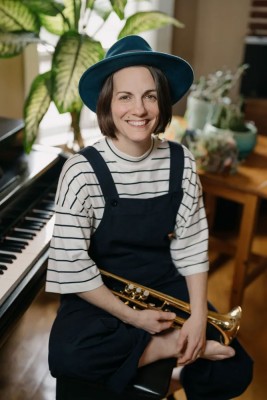 Rebecca Hennessy - NO: Mar 14 - Trumpet & Voice; TO: Feb 9, Sellers and Newel; Feb 18 & Mar 17, Tranzac Club
Rebecca Hennessy - NO: Mar 14 - Trumpet & Voice; TO: Feb 9, Sellers and Newel; Feb 18 & Mar 17, Tranzac Club
Ernesto Cervini - NO: Mar 28; Waterloo: Feb 3 The Jazz Room w. Nicky Schrire Quintet; TO: Feb 15 Jazz Bistro w. Christopher Plock Sextet; Feb 21- 23 The Rex w. Turboprop; Feb 29 Jazz Bistro w. Tune Town
Sophia Perlman grew up bouncing around the jazz, opera, theatre and community arts scene in Toronto. She now eagerly awaits the arrival of her monthly WholeNote to Hornepayne, Ontario, where she uses it to armchair-travel and inform her Internet video consumption.



